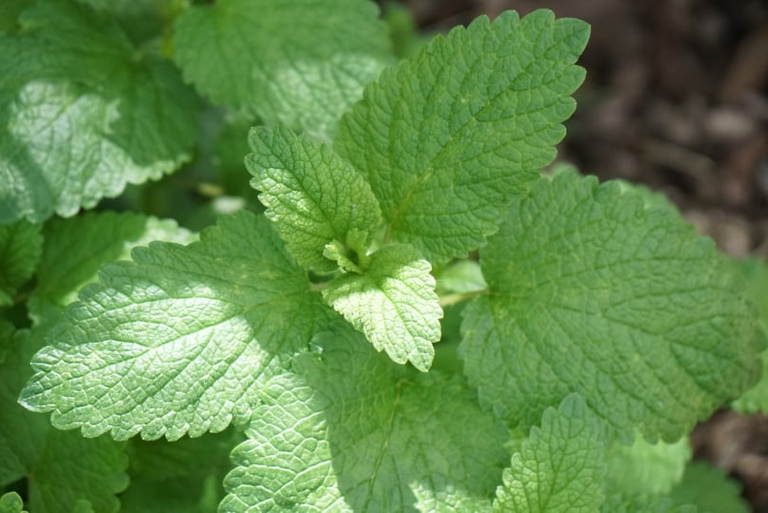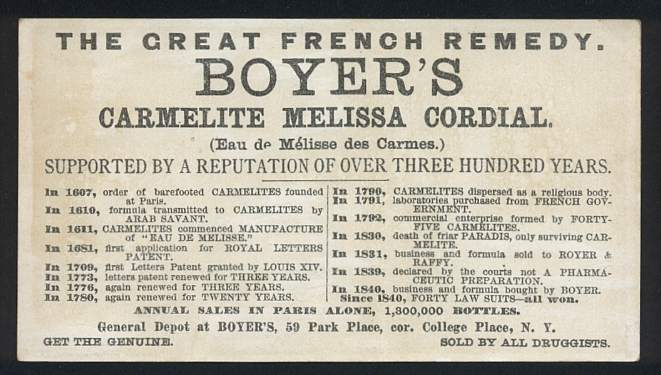One of the things I love about herbalism is that it's often an intellectual exercise which enables you to dive deep not only into nature, but into science, history and culture. Sometimes the starting point is just a herb you have in your garden, which sends you investigating via herbal books and the internet - which is how I ended up making a 600 year old recipe linked to the Carmelite Abbey in France.
Lemon Balm is a beautiful plant - inhaling it's very fragrance is relaxing, and a herbal tea made of this member of the mint family is relaxing and even sleep inducing - it's a good one to mix with hops, lavender, chamomile and other sleepy time herbs. I've put some in an oil to infuse to eventually make a lemon balm salve for herpes (it has some pretty powerful anti viral action) but that's a few weeks away yet (and hopefully I wont get an outbreak in the meantime). Instead, I thought I'd have a go at this medieval recipe, because I find it fascinating to make old recipes like this.

Carmelite water isn't actually water - it's either wine or brandy or another alcohol infused with herbs. The abbeys of Europe were well known for making liquers and tonics with herbs - you might be familiar with Benedictine or Chartreuse. I love the image of the monks and nuns in their physik gardens plucking various medicinal plants to steep in 'water'. Kings and monks alike would enjoy it as a tonic, and it even featured in Alexander Duma's The Three Musketeers. Even the famous English herbalist, botanist and physician, Nicholas Culpepper, wrote about carmelite water:
“It causeth the Mind and Heart to becom merry, and reviveth the Heart fainting to foundlings, especially of such who are overtaken in their sleep, and driveth away al troublesome cares and thought...”

Image Source
Now that sounds just like the brandy talking to me, but I'm always up for giving anything a shot. Trouble is, like many of these old recipes, there's more than one version on the internet and you end up having to just do a little guesswork. So my recipe looks a little like this:
1 cup fresh lemon balm leaves
1/2 cup dried angelica root
2 tsp coriander seed
zest of a small lemon
a cinnamon stick
4 whole cloves
1 bottle (750 ml) brandy
So far, it smells very - alcholic. I've read recipes that add honey to it, so I think I'll try that to make it more palatable. It's meant to be used as a digestive, and a calmative - but currently it smells a bit knock ya socks off.
But, there you go - I've dabbled with a historical recipe.
Now I'm going back to just a straight cup of lemon balm tea in the bath, me thinks. Stress and anxiety relieving, it's a herb for everyone, including children (I'm making a glycerine based sleep time syrup for a friends child who struggles to get to sleep, containing lemon balm, chamomile, and a few other herbs) but it's also good for cognitive function, period pain (hence me in the bath), headaches and even toothache pain (if you have the essential oil).
Do you grow lemon balm?
What do you make with it, or what do you use it for?
Share your story about lemon balm this week in The Herbal Hive - you can win HIVE just for commenting!
With Love,


The Herbal Hive Community
Are you on HIVE yet? Earn for writing! Referral link for FREE account here

Alexander Dumas fed it to his Muskateers?!!! I had forgotten that. Read those books yonks ago. Thanks for the reminder about it being a sleepy tonic my go to is always the famous lavender and camomille and yarrow - because I have so much of it in the garden. I am grieved to say that - sniiiiiiiiiiff - I no longer have lemon balm ANYWHERE on the entire homestead. What survived the ant plague a couple years ago fell to the good intentions of my mother-in-law. She got a helper in under the instructions to pull all the "untidy weeds" from my herb gardens. These included peppermint (GASP) lemongrass and lemon balm. Shock and horror. We always call it bee balm because the bees love it. And now I need to find more. Which is not the easiest in our part of the world
Oh noooo... I recall house sitters pulling all my leeks once as they thought they were spring onions grrrrrrr......
I love how people call it 'bee balm' - I didn't know that until HIVe! Such a cute name. I hope you can find some, it really is gorgeous
The chickens eat my yarrow - I've had to fence it off!
What?! Why? Do they think it's a snack or would it be medicinal to them? My chickens don't touch the yarrow. The wormwood and curry bush on the other hand.....
I HAVE NO IDEA WHY CHICKENS DO WHAT THEY DO.
HAHAHAHAHAAHAHA
Sounds like a wonderful herb! I’ve seen it in many things and enjoy the smell and flavor of it myself.
I love the science and history aspect of herbalism as well! It’s fascinating learning the things we know about the stuff and how it works but also that the people hundreds of years ago learned to use them in remarkable ways to treat things! If only more people realized that so much of science and medicine is based off nature, we would have a much better understanding and appreciation of it! In the meantime, folks like you and I can enjoy that aspect :D
I really hope that more and more people are seeing the value of medicinal plants and diving into these histories, sciences, anecdotes and more - it really has the power to change the world! I don't think I'd recommend carmelite water though - maybe it was the cheap brandy I used haha
Love it! Smells more like knock your socks off. But yeah I'm with you on that bit about maybe the brandy talking. Those monks back in the olden days in France liked their drink quite a bit, I think.
Thanks for the recipe, I'll have to try it one day. I hope you took that bath!
I love what you are saying:
I haven't thought about that but it makes so much sense.
I'm curious to find out what the end result will be of this 🙂
As always, a very inspiring post.
xx
Lemon balm was in the very first herb garden here and is still growing strong out there. It's very hardy here. The only thing I've ever done with it is dehydrate it for the chickens.
What a delicious description of lemon balm, enough to feel and enjoy its fragrance. Your recipe for Carmelite water might give intonation to some out there 😉 It has been very nice to read you and learn about your knowledge, this has been very helpful. So far, I have not used it for mouth canker sores and it is important to know all the uses of lemon balm. I have it in my garden and many times we don't know all the benefits of plants. Thank you @riverflows.
My virtual hug ♥
Few years ago I planted one lemon balm plant, now it is all over the garden....pretty much took half of my herb spiral. I have to clean it otherwise my other herbs will not make it. Even the mint is overtaken by the bee balm. But I love it, I love the smell, the kids love it and I always give some to fellow gardeners if they don't have it in their garden. I have done tea with it when it is dry, or I add few leaves in the summer to the infused water. This year I plan to make a pillow from lavender and melissa(bee balm or as we call it in Bulgaria - matochina). I've been thinking about this kind of pillow for long time, and this year I have plenty if herbs to make it 🙂
Oh wow - matochina! Really! that's cool. I reckon some hops and mugwort would be great additions to that pillow - great idea!!!! I was thinking of doing some sleepytime pillows as well - great idea. My beebalm is yet to take over but I do tend to bring lots inside to dry for tea etc or throw it on the compost as well. Thanks for your great idea and comment, Divi!
Mmm hops and mugwort, sounds good I will add some of these too. Thank you 🙏